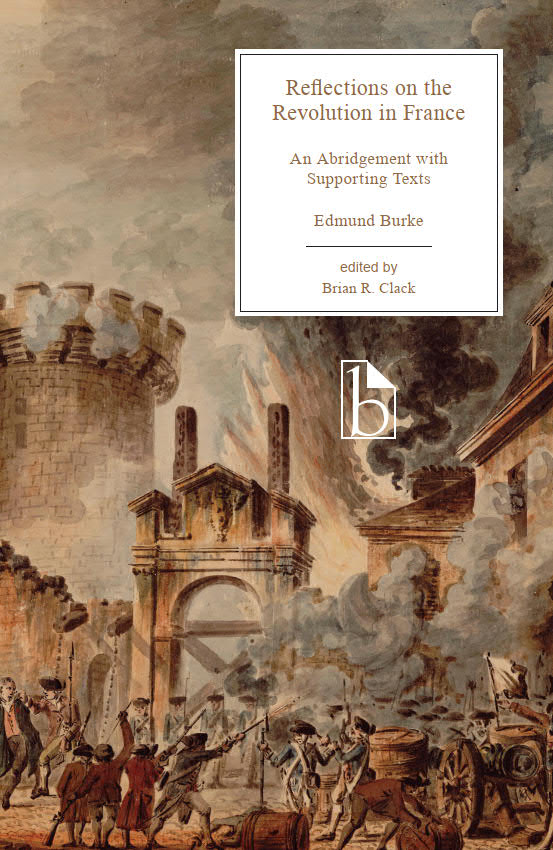On Abridging Burke
Brian Clack
Producing an abridgement of Edmund Burke’s Reflections on the Revolution in France was among the most absorbing experiences of my academic career. It also posed a notable set of challenges. Burke’s text has never before been abridged. True, weighty selections from it have been included in anthologies on conservative thought and in the various “Burke Readers” that have occasionally been produced (my favorite of these being a thirty-page “Abridged but not Emasculated” (!) version in a volume delightfully titled Burke’s Choice Pieces). But no stand-alone abridged edition, still less one with extensive critical apparatus, has heretofore been published.
The goal of the abridgement in this instance was to produce a digestible version of the Reflections for the non-specialist or for those coming to Burke for the first time. The challenge for me was to do this without diminishing the dynamism and energy of Burke’s remarkable writing. The Reflections are written in the form of a letter—of a letter, albeit, that has gotten out of control (Burke occasionally and apologetically alludes to this fact, noting that “a different plan” might have been “more favourable” to the discussion of the subject, and acknowledging towards the end of the work that “This letter is grown to a great length”). Thomas Paine, the most vehement and most appalled of Burke’s critics, found its irregular epistolary style to be one of the most frustrating features of the Reflections: there was no “orderly arrangement of ideas” in Burke’s book, but just “a mob of ideas tumbling over one another.” In the course of producing this edition, I came to see Burke’s style as of a piece with his political thinking. Instead of the rationalistic ordering of a political treatise, which mirrors the revolutionaries’ attempt to impose an artificial order on French society, Burke’s style reflects the spontaneous and flowing beauty of traditional life, with its age-old inns and resting-places and infused with the British ideal of liberty as “going about just as one pleases.”
… it should be an appetizing entry point for the novice, and might entice such a reader into a full engagement with this marvelous writer
With any abridgement, the risk is that the author’s flowing style will be interrupted and stiffened. I found, happily, that the end result in this case was otherwise. The removal of a number of detail-laden passages (concerning, for example, the policies of the National Assembly of France) has seemed, at least to me, to intensify the power of Burke’s polemic. This is not to say that the Broadview edition can ever take the place of Burke’s original; but it should be an appetizing entry point for the novice, and might entice such a reader into a full engagement with this marvelous writer.
One of the things that has presented itself to me most clearly during the composition of this book (and something which I hope will be sensed also by its readers) is how valuable, and now how foreign, the Burkean voice sounds when set amongst the tone of contemporary political discourse. It is remarkable to contrast the measured and humane words of Burke—the father of the conservative tradition—with the reckless and exaggerated rhetoric of today’s so-called “conservatives,” whether in Britain or in the United States. It is hard, indeed, to escape the feeling that our current political climate would benefit from a healthy injection of Burkean wisdom. Never simply reactionary, Burke’s desire is always to reform an improvable state of affairs, but to do this with caution and circumspection, and not to entirely and carelessly overturn things in the hope of achieving some speculated perfect situation in the future. His urge is always to build upon what we currently possess, and what has served us well, and to search for middle ground, for the precious mean between what he calls “the mere alternative of absolute destruction, or unreformed existence.” It is my hope, in presenting this new edition of Reflections on the Revolution in France, that the voice of Burke, whose ideas were “laid in an opposition to extremes,” might find a receptive audience among those understandably disheartened by the increasing and frenzied political polarization of our time.

